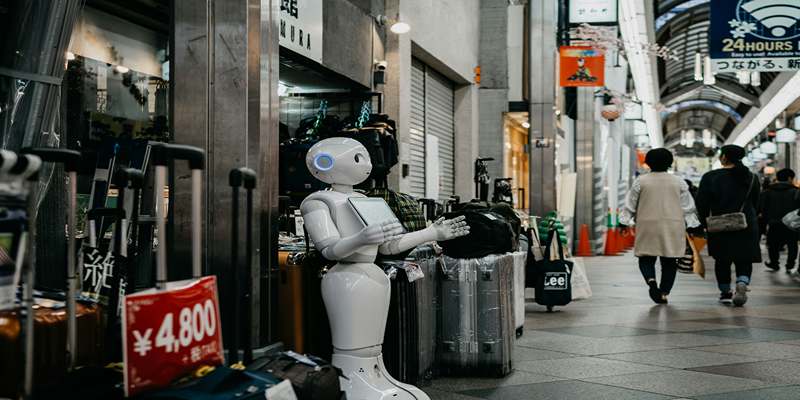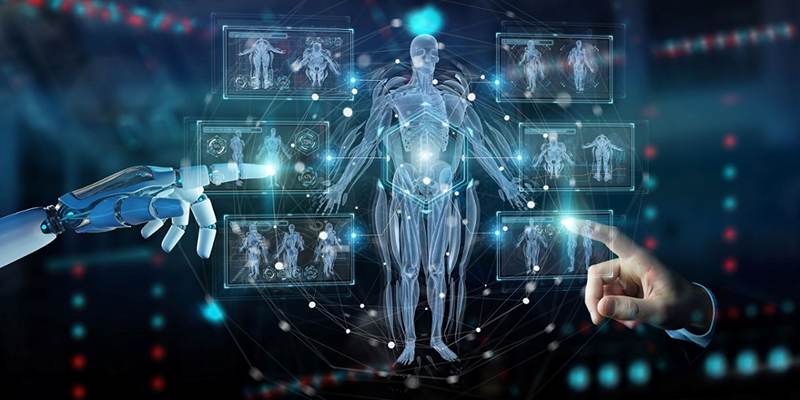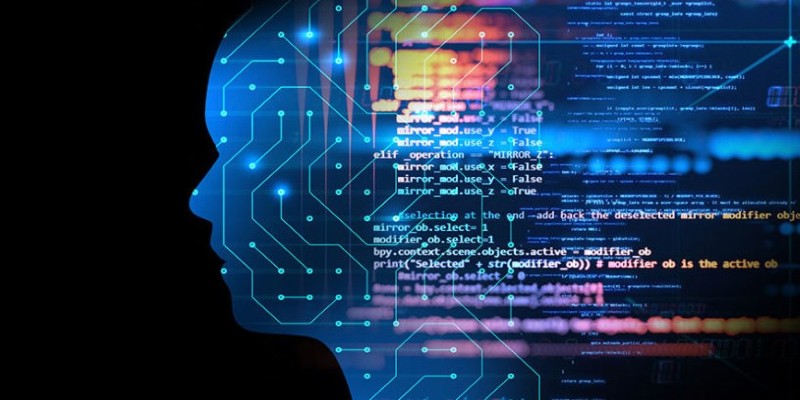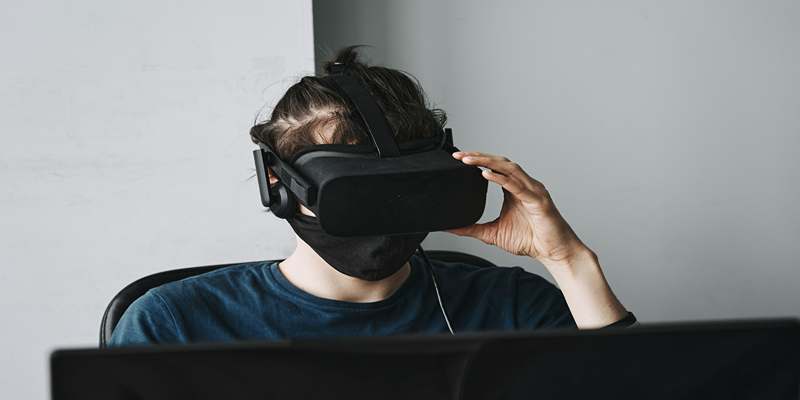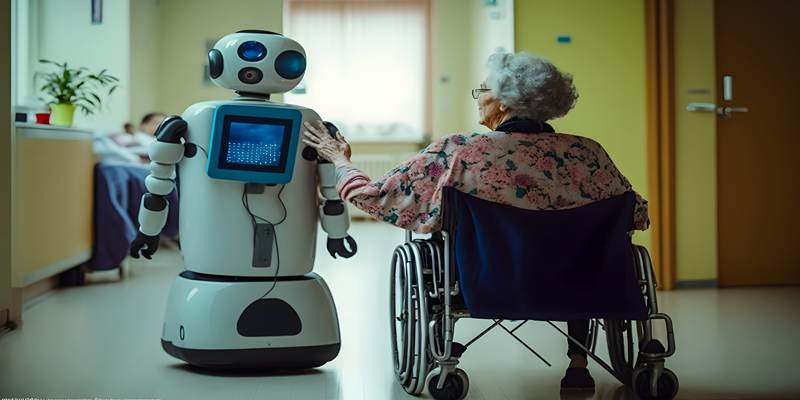AI in healthcare is the area where the world is witnessing the reinvention of healthcare as a new form of medical practice that promises to revolutionize the industry. As for the elderly, AI in digital health indicates individualized treatment, early diagnosis of a disease, and better access to medical services. The technology of seniors’ care is becoming more and more popular, and AI is solving important issues like mobility, chronic diseases, and mental health. With the increasing population of aging people across the world, it is critical to have advanced technologies in order to provide appropriate care. Such technologies as AI in medicine and smart monitoring systems will help to improve the health of people and the quality of their lives, especially of the elderly, turning the healthcare system into something more effective and based on modern technologies.

AI in Healthcare: Transforming Senior Care
AI-Driven Diagnostics for the Aging Population
The first benefit of using AI in senior healthcare is the early diagnosis of diseases. Machine learning algorithms interpret radiographs, blood biomarkers, and genetic markers to diagnose preliminary stages of chronic illnesses, including cardiovascular diseases, diabetes, and neurological diseases. Artificial intelligence algorithms analyze large amounts of data to assist the doctors in making accurate predictions and in suggesting necessary precautions. AI in healthcare is more beneficial in diagnosing dementia and Alzheimer’s disease since cognitive assessment tools can be used to monitor changes in memory and behavior. It also helps in the early diagnosis and treatment of health conditions, hence enhancing elderly people’s quality of lives.
Remote Patient Monitoring and AI Assistance
Remote patient monitoring, which is enhanced by artificial intelligence, is becoming a game changer for seniors in terms of healthcare. These real-time insights assist the healthcare providers to act quickly, hence decreasing hospitalization. Telemedicine solutions supported by artificial intelligence are also beneficial as they allow patients to have remote consultations instead of coming to the clinic very often. In the case of health, predictive analytics helps AI in identifying the health patterns and warning the doctors about the possible complications that may occur. The above technologies for improving senior care enhance the ability of aging people to manage their health issues while avoiding dependence on others.
Senior Care Technology: Enhancing Quality of Life
AI in Assisted Living and Home Care
Robots that are AI-based help the caregivers by performing such functions as mobility assistance, medication prompts, and social interaction. Smart home automation systems help in identifying falls, controlling lighting based on the movement, and tracking the general activity of the seniors. The following developments increase safety and comfort, enabling elderly persons to live in their preferred environments. The use of technologically driven tools in the senior care industry is on the rise, thus making it easier to have the elderly cared for in a way that meets their needs.
Personalized AI Health Solutions for Older Adults
Artificial intelligence in health care involves the use of algorithms to develop a patient’s treatment plan based on patient medical history, patient behavior, and family history. Health and fitness solutions include applications that offer personalized exercises, diets, and mental well-being programs for the aging population. The chatbots also incorporate NLP to alert seniors about when to take their medicine and when to visit the doctor or to answer any questions that they may have regarding their health. Furthermore, they help elderly people in communication, which decreases loneliness and has a positive effect on their psychological state. Such personalized solutions formulated with the help of artificial intelligence assist the aging population to keep their bodies and minds healthy and active, thus extending healthy years, lessening reliance on formal care, and relieving pressure on caregivers and healthcare facilities.

Aging Population Health Solutions: Addressing Key Challenges
AI in Mental Health Support for Seniors
Artificial intelligence finds its application in emotional support and in the case of cognitive therapy. Social robots and artificial intelligence-based buddies are intended to engage the patients in a dialogue and to reduce feelings of loneliness. Furthermore, the models monitor the behavior to identify signs of depression or memory loss, which is an early sign of the disease. cognitive training apps that are designed to produce brain exercises that involve the use of artificial intelligence in order to improve memory and problem-solving abilities. Thus, AI-based mental health applications can be incorporated into aging population health care to help seniors avoid the development of mental health issues.
AI’s Contribution to Mobility and Rehabilitation
Restricted mobility has negative consequences for a senior citizen’s quality of life. Synthetic limbs, bionic, and exoskeleton technologies are making mobility better, giving the elderly a chance to walk again. These devices employ artificial intelligence to mimic the pattern of movement of the user and provide support to match it. Computerized methods involve the information processing of data gathered from the patient to modify the physical therapy programs necessary for the treatment of rehabilitated patients. Besides, robotic-assisted therapy aids the elderly individuals in regaining motion after a stroke or surgery.
Ethical and Practical Considerations in AI-Based Senior Care
Since it deals with health data, privacy and security issues are very important in AI. The use of artificial intelligence in the healthcare sector has to meet certain standards to prevent exposure of patient data to cyber risks. Older people, who often are not aware of the latest practices regarding cybersecurity, are most at risk of becoming victims of cybercriminals. It is crucial to establish transparent policies in the healthcare industry to address the public’s concerns and incorporate encryption measures into AI-based solutions. Furthermore, it is crucial for AI models to not have any prejudice that might influence the treatment provided to elderly patients.
Conclusion
AI is now being applied in senior care to provide early diagnosis, customizable care, and better quality of life. AI and seniors’ care technology like diagnostics, remote care, and support for mental health are enabling the elderly to live healthier lives. Nevertheless, such problems as ethical issues, data protection, and the integration of human care are still crucial for the proper use of artificial intelligence. With the advancement of AI, it will take more of a place in elderly care and help to enhance the healthcare industry. Thus, the use of AI in healthcare will help society design a future in which elderly people will receive the maximum possible assistance.
